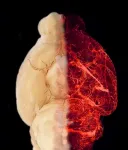(Press-News.org) Is artificial intelligence the key to preventing relapse of severe mental illness?
New AI software developed by researchers at Flinders University shows promise for enabling timely support ahead of relapse in patients with severe mental illness.
The AI2 (Actionable Intime Insights) software, developed by a team of digital health researchers at Flinders University, has undergone an eight-month trial with psychiatric patients from the Inner North Community Health Service, located in Gawler, South Australia.
The digital tool is tipped to revolutionise consumer-centric timely mental health treatment provision outside hospital, with researchers labelling it as readily available and scalable.
In the trial of 304 patients, the AI2 software found that 10% of them were at increased risk of not adhering to treatment plans by failing to take medication or disengaging with health services.
This led to interventions which clinicians believe could have prevented the patient from relapsing and experiencing a deterioration of their mental health.
The web-based tool uses algorithms to automatically flag gaps in care interactions between different parts of the health system.
The project is led by Flinders' Associate Professor Niranjan Bidargaddi who says that the current monitoring, management, and treatment of chronic mental illness across different parts of the health system is poorly coordinated and inadequate.
"In Australia there are about 600,000 people living with a chronic mental illness with multiple morbidities" he says.
"One a patient has sought an initial consultation with a clinician they might be provided with a diagnosis, a mental health care plan and then they are sent off with instructions for treatment such as taking medication or trying therapeutic techniques. Multiple ongoing medical appointments and medications are burdensome for patients to manage on their own.
"The problem is that most clinicians don't have the resources to keep track of every patient manually. This can lead to the patient relapsing and potentially becoming hospitalised."
Some estimates suggest that more than 80% of patients with severe mental illness will relapse several times within the firth five years of their initial treatment.
Patients can relapse for a variety of reasons. They might experience intolerable side effects or little initial benefit from the medication, have a poor understanding of the need for ongoing treatment or suffer circumstances such as forgetfulness or homelessness.
"This puts the patient on a downhill trajectory, can cause a worsening of symptoms and have an increased burden on the public health system," A/P Bidargaddi says.
"AI2 delivers important data in real time, providing clinicians with an effective digital alternative to monitoring patients."
Patients included in the study had diagnoses of schizophrenia, schizo-affective disorder, bipolar or other mood disorders and had been prescribed ongoing psychotropic medications.
If taken properly, antipsychotic, antidepressant and mood stabilising medications are highly effective in reducing the risk of relapse of severe mental illness.
The AI2 software continuously analyses a clinician's consented patients' Medicare Benefit Scheme (MBS) and Pharmaceutical Benefits Scheme (PBS) data, such as medication prescriptions, from the national My Health Records.
Algorithms running on the cloud monitor the patients' data to detect gaps in continuity of care such as medical appointments attendance, prescription refills, or mental health care plan review.
Once the gaps are detected, it triggers an intervention alert with the monitoring clinician, prompting them to intervene.
A/P Bidargaddi says the study found that monitoring the AI dashboard is not onerous.
"The two clinician monitors spend about two hours per week monitoring the dashboard, reviewing case notes and speaking with case managers," he says.
"Feedback from the clinicians at this stage suggests they actually saved time on routine calls, as they would only contact the GP when necessary - such as if the software had detected a missed prescription refill."
While the rollout of AI2 is currently limited to SA, A/P Bidargaddi says the next step for AI2 is for a randomised controlled trial to be carried out across multiple sites.
This will determine whether the technology leads to a reduction in hospitalisation over time, and whether it's cost effective.
A/P Bidargaddi is working with Digital Health CRC to further refine the quality of algorithms further and explore its use in facilitating optimal care interactions for other chronic conditions such as diabetes.
INFORMATION:
Bidargaddi N, Schrader G, Myles H, Schubert KO, van Kasteren Y, Zhang T, Bastiampillai T, Roughead E, Strobel J. Demonstration of automated non-adherence and service disengagement risk monitoring with active follow-up for severe mental illness. Aust N Z J Psychiatry. 2021 Mar 21:4867421998800. doi: 10.1177/0004867421998800. Epub ahead of print. PMID: 33745291.
Exposure to the rhinovirus, the most frequent cause of the common cold, can protect against infection by the virus which causes COVID-19, Yale researchers have found.
In a new study, the researchers found that the common respiratory virus jump-starts the activity of interferon-stimulated genes, early-response molecules in the immune system which can halt replication of the SARS-CoV-2 virus within airway tissues infected with the cold.
Triggering these defenses early in the course of COVID-19 infection holds promise to prevent or treat the infection, ...
Researchers from The Australian National University (ANU) have developed new technology that allows people to see clearly in the dark, revolutionising night-vision.
The first-of-its-kind thin film, described in a new article published in Advanced Photonics, is ultra-compact and one day could work on standard glasses.
The researchers say the new prototype tech, based on nanoscale crystals, could be used for defence, as well as making it safer to drive at night and walking home after dark.
The team also say the work of police and security guards - who regularly employ night vision - will be easier and safer, reducing chronic neck injuries from currently bulk night-vision devices.
"We have made the invisible visible," lead researcher Dr Rocio Camacho Morales said. ...
Data collected for over two decades shows that rising Baltic Sea water temperature is one of the main factors in the increasingly earlier appearance and faster growth of Baltic herring larvae.
Baltic herring (Clupea harengus membras) is commercially the most important fish species in Finland, and an important part of the Baltic marine ecosystem. Conditions during herring spawning may have cascading effects on the whole Baltic ecosystem.
According to a recent research, both developmental stages in Baltic herring larvae, small and large, have shifted their timing to earlier dates.
"This suggests that herring spawn earlier and larvae grow faster, by about 7.7 days per decade. Water ...
Rising numbers of liver cancer in Aboriginal and Torres Strait Islander communities has led experts at Flinders University to call for more programs, including mobile liver clinics and ultrasound in rural and remote Australia.
The Australian study just published in international Lancet journal EClinicalMedicine reveals the survival difference was largely accounted for by factors other than Indigenous status - including rurality, comorbidity burden and lack of curative therapy.
The study of liver cancer, or Hepatocellular carcinoma (HCC), included 229 Indigenous and 3587 non-Indigenous HCC cases in South Australia, Queensland and the ...
Osaka, Japan - On the outside, animals often appear bilaterally symmetrical with mirror-image left and right features. However, this balance is not always reflected internally, as several organs such as the lungs and intestines are left-right (LR) asymmetrical. Researchers at Osaka University, using an innovative technique for imaging movement of cell nuclei in living tissue, have determined the patterns of nuclear alignment responsible for LR-asymmetrical shaping of internal organs in the developing embryo.
Embryogenesis involves complex genetic and molecular processes that transform a single-celled zygote into a complete, living individual with multiple functional axes, including the LR axis. A long-standing conundrum of Developmental ...
Researchers at the University of Helsinki and the Beatson Institute for Cancer Research in Glasgow have discovered how mutated cells promote their chances to form cancer. Typically, the accumulation of harmful cells is prevented by active competition between multiple stem cells in intestinal glands, called crypts.
"The functioning of intestinal stem cells relies on growth factors, named Wnts, produced by the surrounding environment. Intestinal cancers typically originate from stem cells where mutations allow growth independent of these factors. When we removed a gene called Notum, which renders Wnts inactive, from mutated stem cells, the number of precancerous adenomas in the intestine was greatly reduced. We found that ...
Echoing through history by reviving fungal specimens originally preserved and described a flabbergasting quarter of a millenium ago by the "Father of Modern Taxonomy" Carl Linnaeus, this study highlights the untapped potential of museum collections in modern research programmes. The results have just been published in the renowned Cell Press journal iScience.
The "desert coprinus" fungus Podaxis has fascinated scientists and explorers for centuries, still the genus has been subjected to relatively little research. These large mushrooms thrive in hostile and mostly species-free environments and while they occur seasonally ...
Hypertension is a widespread comorbidity of patients with obesity that greatly increases the risk of mortality and disability. In recent years, researchers have found that a high-calorie diet increases the density of blood vessels (hypervascularization) in the hypothalamus - an important "eating control" area in our brain. Researchers hypothesized that elevated hormone levels of leptin are associated with a higher risk of developing hypertension. However, the exact mechanisms that contribute to the condensed growth of blood vessels in the hypothalamus were unknown.
New research conducted by Cristina García-Cáceres' research group at Helmholtz Zentrum ...
Solar activities, such as CME(Coronal Mass Ejection), cause geomagnetic storm that is a temporary disturbance of the Earth's magnetosphere. Geomagnetic storms can affect GPS positioning, radio communication, and power transmission system. Solar explosions also emit radiation, which can affect satellite failures, radiation exposure to aircraft crew, and space activity. Therefore, it is important to understand space weather phenomena and their impact on the Earth.
Space weather research by continuous observation of cosmic rays on the ground is mainly conducted using observation data from neutron monitors and multi-directional muon detectors. Since the phenomenon of space weather is on a short-term, days-long scale, it is effective to investigate changes in the flow ...
Alkaline zinc-iron flow battery (AZIFB) is well suitable for stationary energy storage applications due to its advantages of high open-cell voltage, low cost, and environmental friendliness. However, it surfers from zinc dendrite/accumulation and relatively low operation current density.
Recently, a research group led by Prof. LI Xianfeng from the Dalian Institute of Chemical Physics (DICP) of the Chinese Academy of Science (CAS) developed layered double hydroxide (LDH) membrane with high hydroxide conductivity and ion selectivity for alkaline-zinc iron flow battery.
The ...




